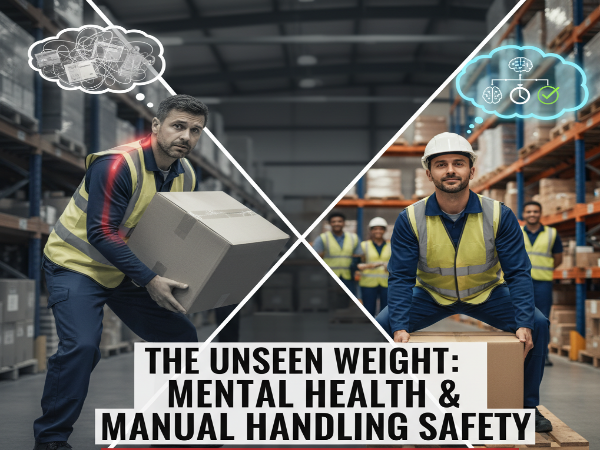Why Mental Health and Focus Matter in Manual Handling Performance

Manual handling remains one of the most common causes of workplace injuries across the UK. While physical fitness and correct lifting techniques are often emphasised, the mental side of performance receives far less attention. Yet, concentration, stress levels, and overall mental wellbeing strongly affect how safely and effectively people handle loads. Understanding this link helps employers build safer, more supportive workplaces.
The Link Between Mental Health and Physical Safety
Poor mental health can directly influence physical safety. When workers experience stress, anxiety, or low mood, their ability to assess risk and react quickly declines. This mental strain often leads to poor posture, rushed lifting, and inattention to hazards. Over time, such conditions increase the likelihood of strains, slips, and other handling injuries.
Stress and Fatigue on the Job
Stress and fatigue are silent but powerful threats to manual handling performance. Long shifts, unrealistic targets, or tight deadlines can exhaust both the body and mind. Fatigue reduces coordination, weakens grip, and causes slower reactions. Workers who are physically tired or mentally drained often lose awareness of their movements, putting themselves and others at risk.
Anxiety and Distraction
Anxiety and emotional distraction also affect how people approach physical tasks. A distracted worker might focus more on personal worries than on the task at hand, missing warning signs or forgetting proper lifting steps. Over time, such lapses lead to a pattern of unsafe habits. Maintaining mental focus is not just a personal responsibility but an organisational priority for safety.
Why Focus is Essential for Safe Manual Handling
Focus allows workers to judge load weight, check their footing, and align their body before lifting. Without it, even experienced staff can make errors that result in injury. Concentration supports every stage of safe handling, from assessing the load to deciding whether help or equipment is needed.
The Role of Attention and Decision-Making
Manual handling relies on constant attention. Workers must make split-second decisions, such as adjusting grip or repositioning to maintain balance. Distraction at these moments can cause dropped loads or back injuries. Mental alertness ensures these small but crucial decisions are made safely and confidently.
Cognitive Overload in Busy Work Environments
In busy environments such as warehouses or construction sites, workers often handle several tasks at once. When demands pile up, cognitive overload sets in. The mind struggles to process multiple inputs, and focus breaks down. This overload not only increases physical risk but also contributes to ongoing stress and mental fatigue, forming a cycle that undermines both wellbeing and performance.
How Employers Can Support Mental Wellbeing
Employers play a vital role in supporting workers’ mental focus and resilience. Addressing mental health is not only a welfare issue but a safety measure. A team that feels mentally supported performs better and makes fewer handling errors.
Encourage Open Communication
Encouraging open discussion about stress or fatigue helps create safer working conditions. When workers feel comfortable raising issues early, supervisors can adjust workloads or schedules before safety suffers. Regular one-to-one meetings and feedback channels promote this openness.
Provide Mental Health Training
Investing in mental health courses for employees can equip staff to recognise early signs of stress or burnout and respond appropriately. These courses can also help management teams respond appropriately, ensuring that employees receive help before mental strain affects safety.
Promote Rest and Recovery
Simple measures like fair shift patterns, regular breaks, and realistic workloads protect focus and reduce injury rates. Adequate rest keeps both body and mind prepared for physical tasks. Without recovery time, even skilled workers become more prone to mistakes and fatigue-related injuries.
The Role of Manual Handling Training
Training remains a key part of any safety strategy. Quality programmes cover correct lifting techniques and risk assessments. Many workers now complete an online manual handling course certificate, which combines theoretical knowledge with practical guidance. Such structured learning builds awareness of both physical and mental factors that influence performance.
Integrating Mental Awareness into Training
Modern manual handling training is expanding beyond physical technique. Integrating mental awareness into each session helps workers understand how stress, fatigue, or distraction affect their actions. Short mindfulness exercises or guided focus drills can prepare the mind before a task begins. When workers learn to centre their attention, they move more deliberately and maintain safer postures. Over time, this awareness becomes a habit that supports both safety and productivity.
Reinforcing Good Habits Through Practice
Repetition strengthens both physical and mental discipline. In training environments, consistent practice allows workers to internalise correct lifting methods while building focus and muscle memory. When repetition is paired with mental checklists, such as assessing surroundings or reviewing load stability, the quality of handling improves. This blend of practice and mindfulness also helps workers stay calm under pressure, reducing the likelihood of rushed movements or poor judgement during busy periods.
Practical Steps for Employers
Employers can make lasting improvements by reinforcing mental focus through workplace design and policy. Clear signage, realistic workloads, and structured shift rotations all reduce stress and mental fatigue. Supervisors should also model calm, attentive behaviour when performing or demonstrating manual tasks. Regular safety briefings that address both physical and psychological readiness remind teams that mental preparation is a key part of the job. These small actions combine to create a culture where alertness and care become routine.
The Overlooked Mind in Manual Handling
Manual handling is often viewed as a physical skill, yet its success depends equally on mental readiness. A strong back and proper posture mean little without focus and clear thinking. Stress, anxiety, and exhaustion weaken performance just as surely as poor lifting form. Workers who feel mentally supported are more confident and attentive, reducing the chance of costly or painful mistakes.
Employers who link mental wellbeing to manual handling safety see measurable benefits. Fewer accidents, lower absenteeism, and higher morale result when teams feel mentally fit to perform their roles. Training that recognises both body and mind as essential parts of safe practice represents a modern approach to workplace safety.
By investing in awareness, rest, and open dialogue, organisations can protect their people and strengthen performance. Manual handling will always involve physical effort, but lasting safety depends on lifting with focus as much as with strength.



